For this weekend's post, here are two pictures of the Spanish Armada engaging the English fleet by an unknown artist of the 16thC English School. One is from Dover's tourism site, and the other from the National Maritime Museum site. Spot the difference? 
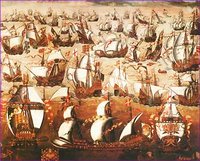
I was recently disappointed to learn that Sir Francis Drake did not indeed insist on finishing his game of bowls while the Armada approached...but it is a plausible story as the English fleet had to wait for suitable weather and tides.
Channel 4's history microsite has more Armada myths and facts.
Finally, a link to the useful Internet Modern History Sourcebook , which has the full text of Elizabeth I's speech to the English forces containing the famous lines "I know I have but the body of a weak and feeble woman; but I have the heart of a king, and of a king of England, too". Hearts of Oak, indeed.
More naval history posts in this blog:
The Battle of Sole Bay, 1672
The Capture of Napoleon by the Bellerophon, 1815
29 July, 2006
The Spanish Armada. Today in history,1588
Posted by
cardinal_wolsey
at
10:28 PM
0
comments
![]()
Labels: 16th Century History, Elizabeth I, naval history, Spanish Armada, Tudor History
27 July, 2006
Castles of the Day
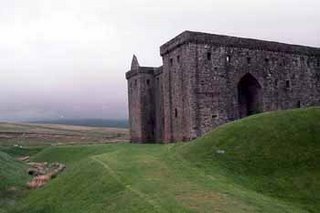
Today's post is inspired by Melissa Snell's great Castles of the Day site on About.Com
Here are some of Cardinal Wolsey's favourite castles:
1. Hermitage Castle , Northumberland, U.K. (pictured). In the middle of nowhere, forbidding, impregnable. Don't even think about attacking it.
2. Threave Castle (aka Thrieve Castle), Castle Douglas, S.W.Scotland. Built by Archibald the Grim. Ring the bell and the boatman comes to row you across to the island where it stands. Get him to wear a cloak and hood for full Styx effect.
3. Fort Ticonderoga, Lake Champlain, USA. Site of four bloody battles in the French and Indian War, and the American Revolution. A must-see if you are in the area.
4. The Castle of Good Hope, Cape Town. The oldest structure in South Africa. Get a real perspective on the origins of this beautiful if edgy place.
25 July, 2006
Time for some more links
For today's post here are some history sites and blogs I have enjoyed looking at recently :
xoom -thanks for the link in your July blog carnival guys.
Geoffrey Chaucer Hath a Blog - brilliant....especially if you did Canterbury Tales at school and didn't get it. Check out "Most fresshe and newe postes".
Tudor England FAQs - all the questions you might expect, plus some you might not,
eg Was Anne Boleyn really a witch? Did she have an extra finger? Did she really commit adultery and have an incestuous affair with her brother? How many times was she pregnant as Queen? Better than Eastenders.
24 July, 2006
James VI becomes King of Scotland (aged 1). 24th July, 1567
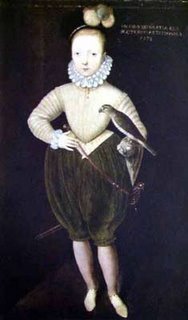
24th July, 1567. Today in history, James VI became king of Scotland aged 13 months.
James acceeded after the abdication of his mum Mary Queen of Scots, (and the earlier murder of his dad, Lord Darnley) and became James I, the first Stuart king of England, in 1608 as a result of an alliance with Elizabeth I against...the French. His reign was highly successful (commissioning the King James Bible, surviving Guy Fawkes' Night, etc).
For a Scottish angle on James's life, follow this link to Scotlandspast.org
For today's post, here is a starter list of other infant kings and queens in history who started young:
1. Mary, Queen of Scots (James VI's mother)probably holds the record, becoming Queen of Scotland aged 6 days old in 1542.
2. James II became King of Scotland aged 6 yrs in 1437
3. Louis the Child became King of Germany, aged 6 yrs, in 899.
4. Richard II became King of England , aged 10, in 1377. See previous post on the Peasants' Revolt.
5. Ethelred the Unready became King of England, aged 10, in 978 (according to one account he pooed in the baptismal font, a bad omen). He also makes it into a previous post on monarchs with odd names
Can reader's add to this list?
Posted by
cardinal_wolsey
at
10:25 PM
3
comments
![]()
Labels: 16th Century History, child kings, James VI of Scotland
23 July, 2006
Thomas Cromwell beheaded on Tower Hill. 23rd July, 1540.
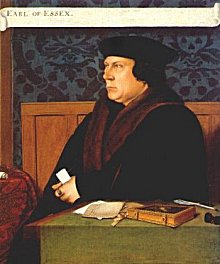
History.net has the date of Thomas Cromwell's demise as 23rd July, although most other sources have the 28th. Anyway, he is featured in today's Tudor post .
Thomas Cromwell (portrait by Hans Holbein jr above)began his government service as secretary to Cardinal Wolsey, and following Wolsey's fall from grace, rose rapidly to prominence as one of Henry VIII's key managers.
His key period of influence was the 1530's, but fame could be shortlived during this period....
In 1538 Henry described Cromwell to the French ambassador as "A good household manager, but not fit to meddle in the affairs of kings".
Cromwell probably took the blame for the fact that Henry claimed he was not informed of the poor physical shape of Anne of Cleves before it was too late to stop the marriage (which Cromwell had arranged).
But there were many of Wolsey's old enemies out to get him, and it was probably only a matter of time before he would be out-manouvered.
Good links to find out more are Englishhistory.net, and the BBC History site.
Posted by
cardinal_wolsey
at
1:36 PM
0
comments
![]()
Labels: 16th Century History, executions, Thomas Cromwell
20 July, 2006
Philip Dormer Stanhope, 4th Earl of Chesterfield. (1694–1773)
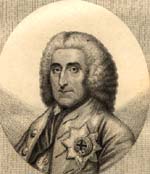
Who's he?, I hear you say. Philip Dormer Stanhope was a statesman (ambassador to the Hague, lord lieutenant of Ireland) and author. Many memorable quotes come from Stanhope's letters to his illegitimate son, (also named Philip Stanhope), published in 1774, designed "for the education of a young man". [Sadly his son died young].
On this day in 1749 he wrote "Idleness is only the refuge of weak minds".
Here is a selection of more of his witticisms from various sources...
"Whatever is worth doing at all, is worth doing well". (my mother's favourite)
Letter, March 10, 1746.
"I knew once a very covetous, sordid fellow, who used to say, 'Take care of the pence, for the pounds will take care of themselves.'”
Letter, Nov. 6, 1747.
"Chapter of accidents"
Letter, Feb. 16, 1753.
"I assisted at the birth of that most significant word 'flirtation', which dropped from the most beautiful mouth in the world".
The World. No. 101.
"Every woman is infallibly to be gained by every sort of flattery, and every man by one sort or other"
"Religion is by no means a proper subject of conversation in a mixed company.”
“Advice is seldom welcome; and those who want it the most always want it the least.”
"Know the true value of time; snatch, seize, and enjoy every moment of it. No idleness, no laziness, no procrastination: never put off till to-morrow what you can do to-day. "
- Letters to his Son
For more on the earl, see this link to the Project Gutenburg site, where you can read the letters to his son.
Posted by
cardinal_wolsey
at
10:50 PM
0
comments
![]()
Labels: 18th Century History, Philip Stanhope, Quotes
17 July, 2006
Arnulf III the Hapless becomes Earl of Flanders. 17th July, 1070
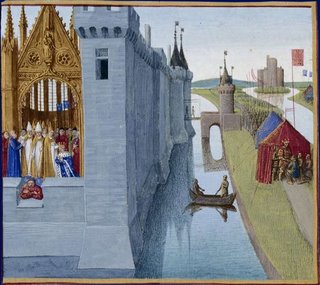
For today's post, we celebrate all those rulers with unfortunate names. In addition to Arnulf the Hapless, I have come across.....
Charles the Stout (conquered Nijmegen in 1473)
Philip III, the Stout, King of France (1270-85)
Ethelred the Unready (king of England 979-1016 )
Charles the Bare (king of Lotharingen, 869)
Robert II, the Vrome (sounds painful)
Louis VI the Fat One, King of France, 1108 (his coronation pictured in the rather nice painting above).
Bertha "with the great feet", wife of French king Pippin III (died 783)
Charles, The Angry One, King of Navarra (1349-87)
Louis X, the Stubborn, King of France (1314-16)
Charles II, the Bald, King of France (843-77)
Louis II, the Stutterer, King of France (877-79)
Charles III the Plain, King of France (893-929)
French monarchs in the majority......and one wife.
Jon Linin has kindly supplied these additions to the post...
Magnus Barelegs - yes he's got a website. Magnus Barefoot (aka "Barelegs"), Viking King of Norway, was killed in battle near Downpatrick in the year 1103.
Niall of the Nine Hostages - Irish ironage king (4th Century)
Charles the Simple, 9th Century king of the Franks.
Posted by
cardinal_wolsey
at
10:40 PM
1 comments
![]()
Labels: 11th Century History, kings with hapless names, Magnus Barelegs, Medieval History
16 July, 2006
Kissing Banned in England. 16th July, 1439
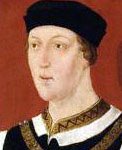
Kissing was banned in England, 16th July 1439, to stop the spread of disease and pestilence. Well that's according to historyorb.com. Don't click this link if you are disturbed by nasty flashing ad's!. According to various sources the people only paid lip service to the banning order.....
Henry VI (pictured left) was on the throne at the time. He nominally became king in 1422 whilst still a baby, and is not generally rated as a success, in spite of two spells as King (1422-61 and 1470-71) . Henry failed to prevent the slide into civil war between Lancaster and York (the Wars of the Roses). He eventually met a nasty end in the Tower of London in 1471. More on Henry VI from the official British royalty info site
Finally, a pertinent quote from Shakespeare's Henry VI, Part III:
"The first thing we do, let's kill all the lawyers"
15 July, 2006
Capture of Napoleon, 15th July, 1815.
Napoleon in fact surrendered to the British man-of-war Bellerophon (known as the Billy Ruffian to its crew), after realising that the possibility of escape through the British sea blockade was remote.
On being transported back to the UK, en route to St Helena and exile, crowds turned out every day to view the former Emperor's daily walk on deck.
See previous post covering his death on St Helena in 1821.
The history of the Bellerophon is desribed in the gripping ship's biography "Billy Ruffian" by David Cordingly.
Posted by
cardinal_wolsey
at
11:14 PM
0
comments
![]()
Labels: 19th Century History, Napoleonic history, naval history
14 July, 2006
This Day in History - Bastille Day, 14th July.

This Day in History for July14th is of course Bastille Day. If you'd like to listen to a rousing version of La Marseillaise, here is a link . The lyrics are bloodthirsty, but good for rousing the troops.
Something a little bit different for today's post is some literary history, from the Writer's Almanac website from US public radio, which I have just discovered via Bloglines. Click on this link to hear the wonderful Garrison Keillor (pictured) tell you about literary anniversaries today (Owen Wister, Woody Guthrie, and Isaac Singer) , and as a bonus he also reads a poem.
Posted by
cardinal_wolsey
at
10:01 PM
0
comments
![]()
Labels: 18th Century History, French history, US literature
12 July, 2006
This Day in History: Kett's Rebellion (July and August, 1549)

Another popular uprising in England for today's post, this time with a particularly tragic finale.
Robert Kett's Rebellion took place in Norfolk in July and August, 1549, in the reign of the young Edward VI. By the time it was finally crushed over 4,000 lay dead.
It was essentially a protest against the enclosure by "robber barons" of the common land, where landless peasants could graze their animals and gather wood, etc.
Robert Kett (pictured above, seated) led a successful assault on the city of Norwich, which was captured after fierce fighting (twice). John Dudley Earl of Warwick eventually arrived with an army of 8,000-14,000 , but a possible deal involving a pardon for the rebels was scuppered when a boy mooned at Dudley's messenger and is shot dead (whether he uttered the words "kiss my arse!" is unknown) ....see painting above.
Grisly details: 3,000 rebels killed in the subsequent battle on open ground, Kett and several hundred others executed (Kett hung from battlements of Norwich Castle).
The issue of enclosure of common land was to return...
Learnhistory.org has a great Robert Kett site with many useful links if you want to find out more.
More posts on popular uprisings:
The Essex Peasants' Revolt, 1381
Jack Cade's Rebellion, 1451
Posted by
cardinal_wolsey
at
9:27 PM
0
comments
![]()
Labels: 16th Century History, Edward VI, Kett Rebellion, rebellions, Robert Kett, Tudor History
11 July, 2006
The Good Parliament (28th April to 10th July, 1376)
Back to English medieval history for today's post.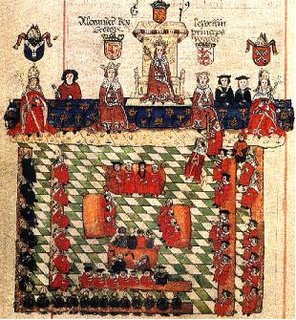
The Good Parliament was the name given to the reforming English Parliament that sat between 28th April and 10th July 1376, in the reign of Edward III.
In those days the monarchy, regarded with general suspicion by the people, tended to avoid calling a Parliament unless money needed to be raised, as was the case in 1376 due to the expense of the war with France.
Sure enough the Parliament flexed its muscles against Edward (and his 4th son and key fixer John of Gaunt), and made a number of moves.
Firstly it appointed the first Speaker, Thomas Hungerford; secondly it introduced impeachment for officials thought to be abusing their power (ie siphoning off Treasury funds). Thirdly it upheld the principle that no taxation should be raised without Parliamentary consent (please note Gordon). Oh, and it also placed the King's aquisitive mistress Alice Perrers "in seclusion".
Although John of Gaunt saw to it that the following parliament undid much of the good work (implementing the dreaded Poll Tax - see previous post on the Peasant's Revolt) , the principles upheld in the "Good Parliament" ultimately won through.
Posted by
cardinal_wolsey
at
10:49 PM
0
comments
![]()
Labels: 14th Century History, Edward III, John of Gaunt, Medieval History, Parliament
09 July, 2006
Lady Godiva rides through Coventry (10th June,1057 or thereabouts)
 On the 10th of June, 1057 (or thereabouts), Lady Godiva rides through Coventry to lower taxes.
On the 10th of June, 1057 (or thereabouts), Lady Godiva rides through Coventry to lower taxes.
Could not resist this one. It may even get a few hits by those interested in adult material. The exact date is open to question, but the story goes as follows..
Lady Godiva was the good wife of tough Leofric, Earl of Mercia, and lived in Coventry UK. She is mentioned in the Domesday Book.
Leofric raised the oppressive Heregeld tax from the people of Coventry in order to pay for Danish king Canute's bodyguard [schoolchildren know Canute mainly for his unsuccessful attempt to reverse the tide, when he got his feet wet].
Godiva pleaded with her husband to relieve the taxes, which he famously agreed to do if she rode naked through the town. She ordered doors and windows to be shut, but was spotted possibly by some monks and a man named Tom (hence "Peeping Tom"). In any case her exploits were recorded in Roger of Wendover's medieval chronicle.
This week the free Godiva music festival takes place in Coventry, complete with Mercian version of the Rio carnival - see this link
More information on the BBC history site
Posted by
cardinal_wolsey
at
10:28 PM
0
comments
![]()
Labels: 11th Century History, Coventry, Lady Godiva, Medieval History
05 July, 2006
6th July, 1661. Samuel Pepys learns his uncle has died
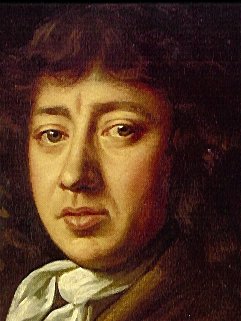
Samuel Pepys' diary is a fascinating and often earthy record of life in the mid-17th century, from Pepys' point view close to the center of power. It is now available as a 17th Century Blog, a brainwave on the part of Phil Gyford, who has been adding daily entries since 2003. This is a great way to dip into the diary, and there are discussion groups too. Here is the URL: http://www.pepysdiary.com/.
The text comes from the Gutenburg Project, which makes copyright-free literature available (for free) on the Internet - please link to http://promo.net/pg/ .
The portrait at right is in the National Portrait Gallery London (http://npg.org.uk)
Here is an extract from the diary entry for 6th July 1661, complete with a smelly corpse and a will Pepys is keen to see. Is Pepys the source of the phrase "in a pickle"?
Waked this morning with news, brought me by a messenger on purpose, that my uncle Robert is dead, and died yesterday; so I rose sorry in some respect, glad in my expectations in another respect. ..... My uncle’s corps in a coffin standing upon joynt-stools in the chimney in the hall; but it begun to smell, and so I caused it to be set forth in the yard all night, and watched by two men. My aunt I found in bed in a most nasty ugly pickle, made me sick to see it. My father and I lay together tonight, I greedy to see the will, but did not ask to see it till to- morrow. (source www.pepysdiary.com)
03 July, 2006
The First Cook's Tour (5th July, 1841)
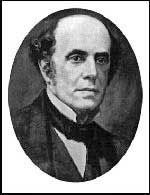

Thomas Cook was a lay preacher, a Baptist teatotaller who thought that the working classes would benefit from less drinking and more education. In 1841, he was walking from his home in Market Harborough to Leicester for a temperance meeting, when... "The thought suddenly flashed across my mind as to the practicability of employing the great powers of railways and locomotion for the furtherance of this social reform..".
On July 5th 1841, the first "Cook's Tour" took place when he organised a Sunday outing for around 500 teatotallers fom Leicester to Loughborough and back in open railway carriages for a shilling a head.....no buffet car, or probably decent brakes.
Cook's single-minded vision led to rapid expansion of his enterprise. Here are some of the milestones....
1851 Trips to the Great Exhibition at the Crystal Palace in London.
1855 First package trip abroad: to the Paris Exhibition via Harwich and Antwerp (more fun than Eurostar)
1864 First tour to Italy
1865 First exploratory trip to North America
1872 8-month round-the world tour from Leicester at age of 62. This became an annual event, at bargain price of £300.
1874 First Travellers' Cheques issued
1919 Flights in Handley-Page aircraft from Cricklewood.
Linguistic bit: the term "Cook's Tour " has two different meanings, relating to different famous Cooks.
Referring to Thomas Cook, a "Cook's tour" is a guided tour of a place, or subject, that only covers the key highlights.
The other meaning refers to Capt. James Cook, meaning a roundabout route, reflecting his voyages of discovery in his ships Endeavour and Resolution.
Posted by
cardinal_wolsey
at
9:56 PM
0
comments
![]()
Labels: 19th Century History, Capt. James Cook, History of Travel, Thomas Cook

